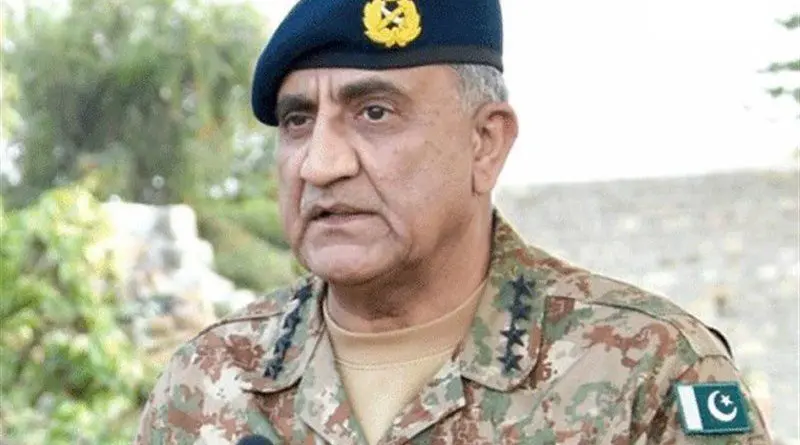After General Qamar Jawed Bajwa: Prospects For India-Pakistan Relations – Analysis
By Institute of South Asian Studies
By C Raja Mohan*
After six years as Pakistan’s powerful Chief of Army Staff, General Qamar Jawed Bajwa stepped down at the end of November 2022 amid widespread criticism of his destabilising political role at home. In a powerful editorial, The Friday Times declared that Bajwa’s “role in the last six years of instability and constitutional aberration should not be forgotten or forgiven. It should serve as a lesson for self-serving adventurers”.
Although he was publicly disavowing an interest in the further extension of his term and proclaiming that the Army had decided not to intervene in domestic politics, Bajwa was apparently playing a continuous ‘double game’ with the civilian political leaders to prolong his own tenure. Whether the civilian leaders of Pakistan and the new army chief, General Asim Munir, will learn any lessons from the last six years, they have a great challenge in undoing Bajwa’s legacy, who leaves behind a country at odds with itself.
Bajwa’s most damaging actions have been to oust Prime Minister Nawaz Sharif on flimsy grounds in 2017, rig the 2018 elections and stitch together a majority in the national assembly in Imran Khan’s favour. The so-called ‘hybrid regime’ of Bajwa and Khan confronted contradictions of its own, leading to the defeat of the latter in a no-confidence vote in April 2022. Unlike the previous prime ministers, who meekly acquiesced, Khan mobilised the masses against the establishment and demonstrated that the Army can be challenged with support from the street.
While Bajwa’s domestic record has come under a cloud, his reputation on the foreign policy front remains positive. Bajwa helped correct the foreign policy orientation of Pakistan shaken by Khan’s decisions to strike out on his own – in aligning with Turkey against traditional benefactor Saudi Arabia, adopting an anti-American posture and showing up in Moscow in February 2022 on the eve of Russia’s invasion of Ukraine. Bajwa also mobilised international support to end the sanctions imposed by the Financial Action Task Force.
Bajwa articulated a doctrine – the so-called Bajwa Doctrine – of seeking good neighbourly relations with India and Afghanistan and shifting focus from geopolitics that dominated Pakistan’s foreign policy thinking to geo-economics that would concentrate on Pakistan’s growth and prosperity. This certainly expressed itself in Pakistan’s engagement with India.
Bajwa took the lead in promoting the Kartarpur Sahib corridor that allows Indian pilgrims to travel, without visas, almost three miles from the border into Pakistan to worship at the birthplace of Guru Nanak, who founded the Sikh religion six centuries ago. The corridor was set up in late 2019 after some complex negotiations between Delhi and Islamabad. Given the severity of restrictions on cross-border travel between the two nations, the Kartarpur corridor was a small but significant step forward in bilateral relations. The second was the agreement in February 2021 between the two military establishments to cease fire all along the militarised frontier. Delhi and Islamabad agreed on a ceasefire way back in 2003 that collapsed over the years into intense shelling by both sides. The ceasefire agreement was reportedly reached in the back channel negotiations between India’s National Security Adviser Ajit Doval and Bajwa. It is important to remember that Pakistan decided to move forward on these two important issues, despite Pakistan’s anger at India’s constitutional amendment in August 2019 that changed the political status of the Kashmir region within the Indian union.
In the wake of the ceasefire agreement, there was hope that Pakistan would resume overland trade links with India and the two sides would begin to take small steps to re-engage each other. However, that did not materialise when Khan ruled out the resumption of engagement with India until Delhi reversed its 2019 moves in Kashmir. Reports from Pakistan suggested that Bajwa was a little more flexible and was willing to explore potential compromises. However, formal engagement between the two sides remains stalled, while the ceasefire has largely held.
Where does that leave India and Pakistan? It will be a while before Munir’s approach to India will be known. The civilian leaders in charge of the current government, including Nawaz Sharif and Asif Ali Zardari, have long been in favour of the normalisation of ties with India. But they are not in a position to incur the wrath of Khan in an effort to befriend India by putting the Kashmir question on the back burner. Meanwhile, Pakistan is fully preoccupied with a deep macroeconomic crisis, sharp internal political divisions, tensions in its relations with Afghanistan and a declining global strategic salience.
The normalisation of relations with India might arguably be part of the answer to these challenges but Islamabad may not be ready to make a major move until the 2023 elections. By then, India will be approaching its own general elections due in the spring of 2024. For now, India is quite comfortable with the minimalism in its relations with Pakistan. It would wait and watch the domestic dynamic in Pakistan before undertaking any fresh initiatives. This pessimistic outlook could, however, change if the civilian government and the new army leadership decide to bite the bullet and plump to engage India without any preconditions on the Kashmir question.
. . . . .
*About the author: Professor C Raja Mohan is a Visiting Research Professor at the Institute of South Asian Studies (ISAS), an autonomous research institute in the National University of Singapore (NUS). He can be contacted at [email protected]. The author bears full responsibility for the facts cited and opinions expressed in this paper
Source: This article was published by Institute of South Asian Studies

